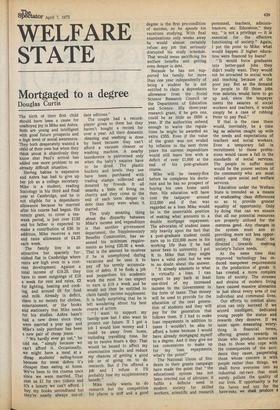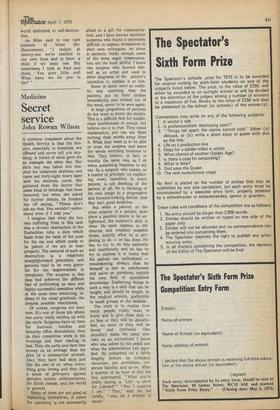Mortgaged to a degree
Douglas Curtis
The birth of their first child should have been a cause for unalloyed joy in Mike and Ashra. Both are young and intelligent with good future prospects and a high level of social awareness. They both desperately wanted a child of their own but when they think about it objectively they know that Paul's arrival has added one more problem to an already difficult situation.
Having babies is expensive and Ashra has had to give up her job as a college secretary. Mike is a student, reading Sociology in his third and final year at Cambridge, and he is not eligible for a dependants allowance because he married after his course had begun. His termly grant, to cover a tenweek period, is just over £120 and his father is expected to make a contribution of £30. In addition, Mike receives a rent and rates allowance of £4.25 each week.
The family live in an attractive but sparsely furnished flat in Cambridge where rents are high even in a costrent development. Against a total income of £19.25, they have to meet outgoings of £10 a week for rent and rates, £2 for lighting, heating and cooking, and around £8 for food and milk. Already in deficit, there is no money for clothes, entertainment, or the books and stationery that Mike needs for his studies. Ashra hasn't had a new dress since they were married a year ago and Mike's only purchase has been a new pair of cheap jeans.
"We hardly ever go out," he told me, "simply because we can't afford it. Occasionally, we might have a meal at a cheap students' eating-house because for meat dishes it's cheaper than eating at home.
We've been to the cinema once since we were married. That cost us £1 for two tickets and it's a luxury we can't afford. I buy my books secondhand but they're nearly always out-of date editions."
The couple had a recordplayer given to them but they haven't bought a record for over a year. All their domestic cleaning and washing is done by hand because they can't afford a vacuum cleaner or washing machine. A nearby launderette is patronised only when the baby's nappies have to be dried. The plastic buckets and bowls they use have been purchased with trading stamps collected and donated by friends. It all smacks a little of living on charity and they come to the end of each term deeper in debt than they were when it started.
The truly amazing thing about the disparity ,between Mike's income and expenditure is that another government department, the Supplementary Benefits Commission, has as sessed his minimum requirements as being £25.90 a week.
That is the amount he receives if he is unemployed during vacations and he uses it to pay off his termly accumula tion of debts. If he finds a job and jeopardises his academic work the most he can expect to earn is £18 a week and he would not then be entitled to claim family income supplement. It is harly surprising that he is left wondering about his best course of action.
"I want to support my family now but I also want to protect our future. If I got a job I would lose money and I could be away from home, including travelling time, for up to twelve hours a d,ay. That would be bound to affect my examination results and reduce my chances of getting a good job or of going on to do research. But if I'm offered a job and I refuse it I'll probably lose my supplementary benefit."
Mike really wants to do research but the competition for places is stiff and a good degree is the first pre-condition of success, so he spends his vacations studying. With final examinations only weeks away he would almost certainly refuse any job that seriously disrupted his study schedule. That would mean sacrificing his welfare benefits and getting even deeper in debt.
Because he has not supported his family for more than one year independently of being a student he is not entitled to claim a dependants allowance from the Social Science Research Council or the Department of Education and Science. His three-year research grant, if he gets one, could be as little as £650 a year. If the authorities unbend, enough to waive the regulations he might be awarded an extra £355. Even if the value of the grant was not eroded by inflation in the next three years his current expenditure would still leave him with a deficit of over £1,000 at the end of his post-graduate course.
Mike will be twenty-five before he completes his doctorate and he has no prospect of buying his own home until then. His education will have cost the taxpayer around £12,000 and if that was regarded as a loan Mike would be in the unenviable position of making what amounts to a double mortgage repayment. The advocates of student loans rely heavily upon the fact that a post-graduate student could earn up to £22,000 more in his working life than if he had never been to university. I put it to Mike that they might have a valid point but he was in no doubt about the answer.
"It already amounts to what is virtually a loan. I can expect to pay back at least one-third of my increased income to the Government in the form of taxes. That money will be used to provide for the education of the next generation of students and they will pay for the generation that follows them. If I had to make loan repayments in addition to taxes I wouldn't be able to afford a home because I would have already mortgaged myself to a degree. And if they give me tax concessions to make up for my loan repayments, what's the point?"
The National Union of Students in their grants campaign have made the point that "the educational system has not been erected out of altruism; it fulfils a definite need in modern society for skilled workers, scientific and research personnel, teachers, administractors, etc. Education," they say, " is not a privilege — it is essential for the effective functioning of society." Again, I put the point to Mike: what would happen if higher education were financed by loans?
"It would force graduates into better-paid jobs they didn't really want. They would not be attracted to social work and teaching because of the poor pay. But as the demand for people to fill those jobs rose salaries would have to go up and, since the taxpayer meets the salaries of social workers and teachers, it would simply be a case of robbing Peter to pay Paul."
If that is the case there would, inevitably, be a time lag as salaries caught up with the needs and expectations of teachers and social workers. Even a temporary fall in recruitment to those professions would cause a fall in the standards of social services. The people to suffer most would be the poorer sectors of the community who are most reliant upon social and welfare services.
Education under the Welfare State is intended as a means of eradicating class differences so as to provide greater equality of opportunity. Only by doing that can we ensure that all our potential resources are properly utilised for the common good. Any changes in the system must aim at providing more not less opportunity and they must be directed towards meeting society's future needs.
At the same time that improved technology has reduced manpower requirements in the production of goods it has created a more complex form of society. The stresses and strains of modern living have caused massive alienation in just about every area of our individual and communal lives.
Our efforts to combat alienation can only succeed if we accord intelligent, dedicated young people the status and rewards they deserve. If we insist upon measuring every.
thing in financial terms, offering greater rewards to those who produce motor-cars than to those who cope with the consequences of the acci dents they cause, pauperising those whose concern is with people rather than things, we shall force everyone into an industrial rat-race that must surely pollute the quality of our lives. If opportunity is for the haves and not for the have-nots we shall produce a world dedicated to self-destruction.
As Mike said in one rare moment of bitter disillusionment, "I reckon at twenty-one we're entitled to our own lives and to have a child if we want one. But sometimes I look at Paul and think, ' You poor little sod! What have we let you in for?' "



































 Previous page
Previous page